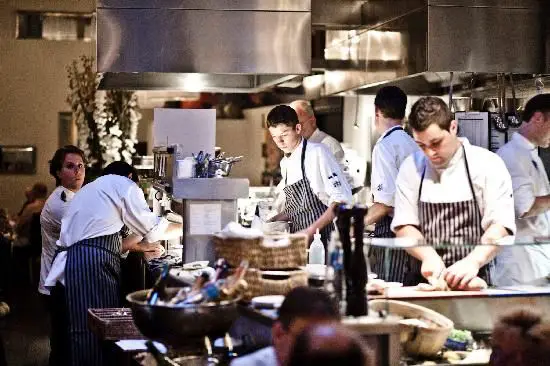
The brigade system was instituted by Escoffier to streamline and simplify work in hotel kitchens. It served to eliminate the chaos and duplication of effort that could result when workers did not have clear-cut responsibilities. Under this system, each position has a station and defined responsibilities, outlined below. In smaller operations, the classic system is generally abbreviated and responsibilities are organized so as to make the best use of workspace and talents. A shortage of skilled personnel has also made modifications in the brigade system necessary. The introduction of new equipment has helped to alleviate some of the problems associated with smaller kitchen staffs.
The chef is responsible for all kitchen operations, including ordering, supervision of all stations, and development of menu items. He or she also may be known as the chef de cuisine or executive chef. The sous chef is second in command, answers to the chef may be responsible for scheduling, fills in for the chef, and assists the station chefs (or line cooks) as necessary. Small operations may not have a sous chef
One of the definitions of a business organization is an arrangement of people in the job to accomplish the goals of the operation. Similarly, the organizational structure of the Kitchen staff will reflect the needs of the operation, the job functions and the various goals. Food Production organization vary according to the needs of the enterprise’s design.
The classical (continental) organization of a Kitchen varies widely, but commonly in such an organization a Chef de Cuisine (Exec. Chef) is in charge and a Sous Chef (under Chef) supervises the kitchen and the heads of the various departments or section (Chef de Parties). Under these Chefs are Assistant Cooks (Demi Chefs), Commis and other workers.
Of the several categories of organization, the Kitchen is an example of a Line Organization. (A-Line Organization is one in which authority and responsibility flow down from the top (Exec. Chef) through the various positions to the last position of the operation). There can be no jump of authority or responsibility. If the top man gives an order it runs down the ranks until it is delegated to the proper level. Every job even the lowest, in a line organization, has a certain amount of responsibility.
Naturally, as one goes higher in the line organization the responsibility becomes greater. In a line organization, the top position holds full responsibility for everything that happens in the organization.
BASIS OF KITCHEN ORGANIZATION
The purpose of kitchen organization is to assign or allocate tasks so they can be done efficiently and properly and so all workers know what their responsibilities are. The way a kitchen is organized depends on several factors.
1. The menu.
The kinds of dishes to be produced obviously determine the jobs that need to be done. The menu is, in fact, the basis of the entire operation. Because of its importance, we devote a whole chapter to a study of the menu ..
2. The type of establishment.
The major types of food service establishments are as follows:
- • Hotels
- • Institutional kitchens
- Schools
- Hospitals, nursing homes, and other health-care institutions
- Employee lunchrooms
- Airline catering
- Military food service
- Correctional institutions
- • Catering and banquet services
- • Fast-food restaurants
- • Carry-out or take-out food facilities
- • Full-service restaurants
3. The size of the operation (the number of customers and the volume of food served).
4. The physical facilities, including the equipment in use.
Depending on the above factors the classical kitchen brigade can be fabricated as follows:

*** Under each section, commi I,II AND III should be included.